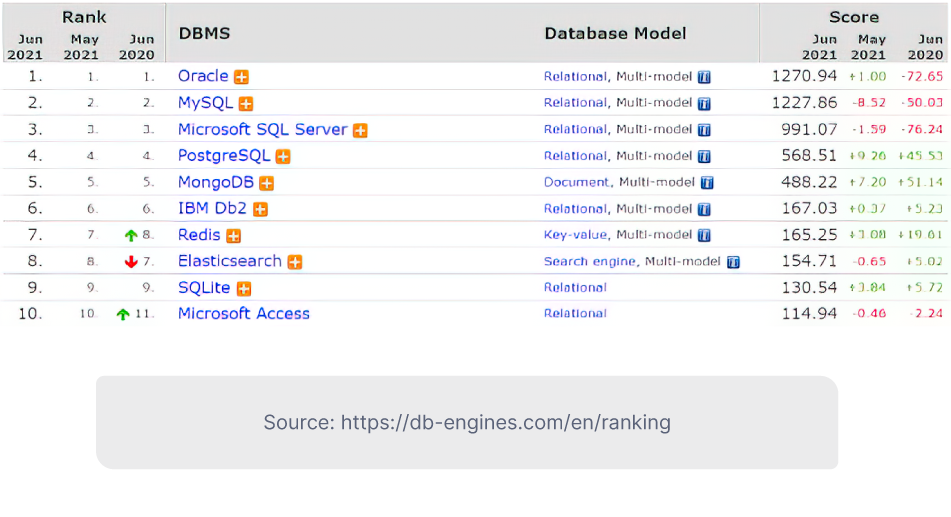5 Reasons Why MySQL Is Still The Go-To Database Management System

Databases are an essential back-end feature of most software applications. They are where all data is collected, stored and organized. Whenever you conduct a web search, log in to an account or complete an online transaction, a database system is silently recording the information in a structured manner. This makes data access simple and reliable in the future.
Given how much data we now generate, it’s easy to see why robust database structures are so important in web development today. Organizations are collecting vast amounts of quantitative and qualitative data, but need reliable data models and database software to turn this into a competitive advantage.
In reality, any application with even a moderate level of complexity will likely require the use of Database Management Systems (DBMS) that can handle all the database files. A DBMS offers a systematic solution for the collection of data - a way to create, maintain and control access to database files. The database design optimizes the way in which stored data can be structured, manipulated and retrieved in a secure manner.
There are many DBMS out there, but in this article we’re going to look more closely at one of the most well established and popular options: MySQL.
What is MySQL?
MySQL is a relational database management system (RDBMS), which means it stores records in multiple, separate, and highly codified tables rather than a single repository.
It was first developed by a Swedish company, MySQL AB, in the mid-1990s and its popularity grew quickly after it was made open-source in 2000. MySQL AB was later purchased by Sun Microsystems, which in turn was acquired by US tech giant Oracle in 2010. It is named after co-founder Monty Widenius's daughter, My, and the acronym for Structured Query Language (SQL), which is used for interacting with SQL databases.
Today, MySQL is the second ranking RDBMS solution in the world, according to DB Engines. Its users include a wide range of websites and applications, including household brands like Spotify, Netflix, Facebook and Booking.com. Below we’ll look at the importance of MySQL and why it remains popular in a competitive market.

5 Key Benefits of MySQL
- Open-source and compatible: This simply means that anyone can install and use the basic software, while also enabling third parties to modify and customize the source code. More advanced versions, which offer additional capacity, tools and services, come with tiered pricing plans.
MySQL is also built to be highly compatible with a wide range of systems, programming languages and database models. This includes alternative DBMS solutions, SQL and NoSQL databases and cloud databases. MySQL also has extensive capabilities for database design and data modeling (e.g. conceptual data models or logical data models). This makes it a simple and practical option for many organizations, while reducing fears of being ‘locked in’ to the system. - Fast and reliable: MySQL was developed for speed, even if this may come at the expense of some additional features. It is also known for its reliability as a database administrator, backed by a large community of programmers that have put the code through tough testing. Another benefit is that it is relatively simple to learn and use. And as it has been around for nearly three decades, it’s not hard to find experienced MySQL developers when you need them.
- Availability: Online businesses and web platforms need to be able to provide round-the-clock services for a global audience. This is why high availability is a core feature of MySQL. It uses a range of cluster servers and data replication configurations that ensure uninterrupted uptime even if there is a failure. MySQL also uses a variety of backup and recovery strategies to ensure data is not lost in the event of a system crash or unintentional delete.
-png.png)
- Scalability: As data volumes and user loads increase, the database store needs to be scaled-up. It must be able to cope with the additional workload without a drop in performance. MySQL can be scaled in different ways, typically via replication, clustering or sharding (or a combination of them). It is able to support and process very large databases, though this is likely to have an impact on speed. For an interesting case study, you can read about how Pinterest scaled their MySQL solution here.
- Security: This is always an important consideration for businesses as they need to protect sensitive data and defend against cyberattacks. MySQL offers encryption using the Secure Sockets Layer (SSL) protocol, data masking, authentication plugins, and other layers of security to protect data integrity. The MySQL Enterprise package also includes firewall protection against cyberattacks.
Why Choose MySQL?
Having been around for a lifetime in tech terms, MySQL can’t really be considered the ‘cool’ option for developers today. It faces stiff competition from the likes of Microsoft SQL Server and (more recently) PostgreSQL, but continues to do the job that developers want it to.
In fact, according to the Stack Overflow Developer Survey 2020, MySQL was still considered the most popular database technology by professional developers. However, it does fall down the rankings when it comes to which database technology is most loved.
Should you choose MySQL? Its longevity and popularity means it should certainly be on your radar, but the full answer really depends on your organization’s priorities, resources, and ambitions. Typically, MySQL could be considered a good option for smaller businesses or organizations that don’t have a large or sophisticated data team. This is because of its low costs and simple setup process, as well as the widespread support of a huge community.
If you need to expand your IT team with experienced developers that know how to deploy and maximize the benefits of MySQL, or any other DBMS, then we can help. Our pool of Latin American developers is selected for their skills, experience and willingness to keep learning and improving - don’t hesitate to get in touch to find out how they can support your organization.
--
If you want to stay up to date with all the new content we publish on our blog, share your email and hit the subscribe button.
Also, feel free to browse through the other sections of the blog where you can find many other amazing articles on: Programming, IT, Outsourcing, and even Management.

With over +16 years of experience in the technology and software industry and +12 of those years at Jobsity, Santi has performed a variety of roles including UX/UI web designer, senior front-end developer, technical project manager, and account manager. Wearing all of these hats has provided him with a wide range of expertise and the ability to manage teams, create solutions, and understand industry needs. At present, he runs the Operations Department at Jobsity, creating a high-level strategy for the company's success and leading a team of more than 400 professionals in their work on major projects.